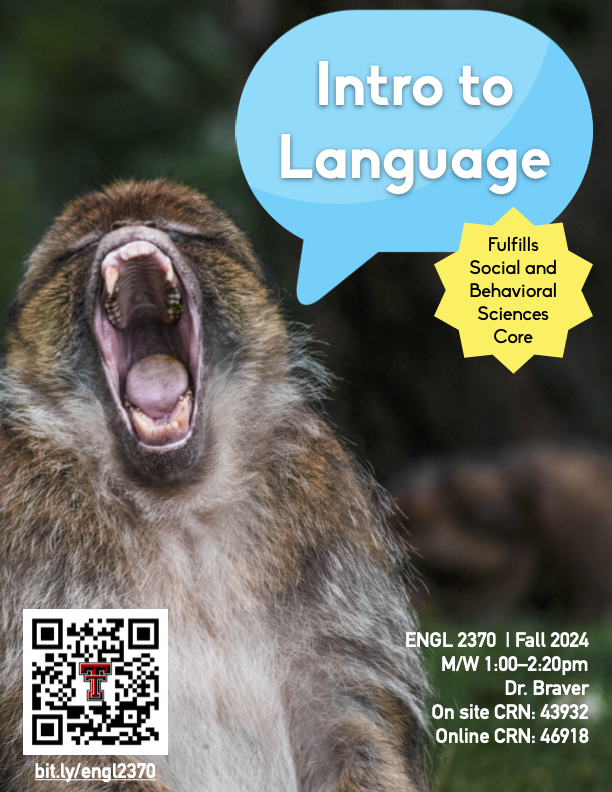ENGL 2370, Fall 2024
Fulfills Social and Behavioral Sciences Core requirement
M/W 1:00–2:20pm On site (CRN 43932): Humanities 308 [map] Online (CRN 46918): via Zoom
Does the brain process emojis in the same way it processes spoken language? Why is the Pokémon named “Snorlax” larger than the one named “Pikachu”?
This course provides a broad overview of language—its structure, its origins, and its role in society. We'll try to understand why language is so weird (Why does the tiny island of Papua New Guinea have over 800 languages? Why does the !Xóõ language have 164 consonants?) by applying the tools of linguistics to the language we encounter in our daily lives and to languages from around the world.
What sorts of topics will we cover?
- What makes human language special?
We’ll discuss methods and criteria for understanding why language is uniquely human, and why this isn’t such a straightforward question. - Why don't any languages snort?
What sounds do languages have? We’ll learn how the vocal tract anatomy effects our ability to speak, and we’ll apply methods used by linguists to analyze the sounds of unfamiliar languages. - The Eskimo snow myth
Eskimo languages don't have hundreds of words for snow. Why is this myth so enticing, and what can it tell us about our own language? - Accents and dialects
Why do we have different accents? We'll learn the tools used by sociolinguists to analyze linguistic variation—from interviews and questionnaires to undercover experiments. - Language and social media
As social media becomes as important—if not more so—than face to face communication, linguists have had to update their methods of analysis. How can we study online language? - What was the first language?
We’ll assess various theories about the beginnings of language. We’ll also learn the methods used by historical linguists to bring dead languages back to life. - Artificial languages
Un-natural languages—like Klingon, Dothraki, and Esperanto—have been created for fun, profit, and to bring about global harmony. We’ll discuss the methods used to create these languages, and the role they play in our society. - Does your language limit your thoughts?
Language and thought are intimately linked—but linguists disagree about just how tight that link is.
What did previous students think?
The last time Dr. Braver offered this course, students rated it 4.9/5 for being a "valuable learning experience", and 4.8/5 for "overall instructor effectiveness".
Want to know more?
Email the instructor: <aaron.braver@ttu.edu>
 Intro to Language
Intro to Language